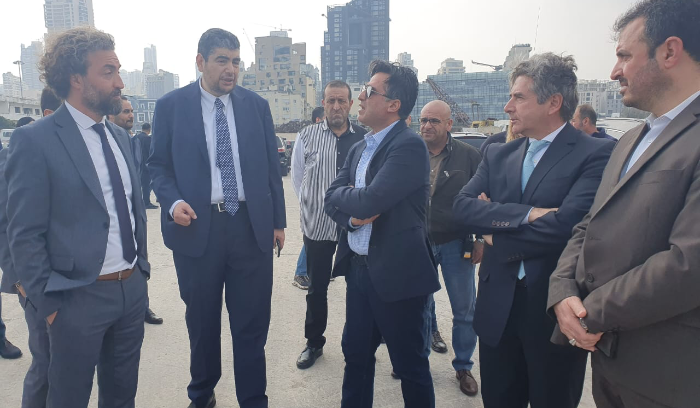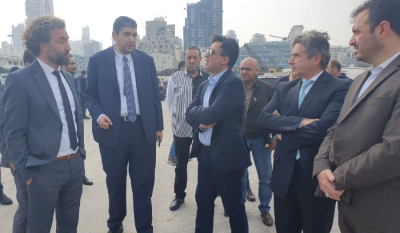Lebanon's Minister of Public Works and Transport, Ali Hamieh, announced in a press conference today at the Port of Beirut, attended by the port's board of directors, members of the Petroleum Sector Authority, and the director of "Total," that 34,000 square meters of space on the port's docks have been designated for providing logistical services for oil and gas exploration activities in Lebanon, exclusively for petroleum logistics services. He also mentioned that they have obtained the approval of the State Consultative Council for a draft decree to establish a new specialized port.
Hamieh stated, "We will not intervene in the internal procedures of 'Total'; our role is solely to provide them with the necessary conditions in Lebanon. Companies that wish to engage must meet the criteria and apply to 'Total' for cooperation." He considered that the issue of oil and gas exploration is "a lifeline for Lebanon," noting that "two weeks ago, the first practical step was taken through the environmental survey conducted by 'Total' in Block 9," emphasizing that "the Ministry of Energy is the key player in the exploration process with the relevant companies."
He pointed out that "the role of the Ministry of Public Works and Transport is concerned with the ports' grounds, the movement of ships in the territorial waters, and helicopters related to this matter." He mentioned, "Two months ago, we sent a letter to the Minister of Energy and the Petroleum Sector Authority indicating that oil platforms should be serviced from land and Lebanese ports, in accordance with existing laws. The aim is to provide job opportunities for Lebanese in Lebanese ports and to operate local companies to yield financial returns not only for the state but also for the operators of these ports."
He added, "Our work focuses on securing land for logistical services for petroleum activities. Companies wishing to work with 'Total' must coordinate with them, as they are the ones responsible, not the port. The ministry owns the land and issues licenses; however, the decision to work with companies rests with 'Total,' which has its electronic platforms."
Hamieh continued, "In this context, we have allocated land at the Port of Beirut spanning 34,000 square meters, which will be exclusively for logistical services for oil and gas exploration activities, according to international standards and must be close to the dock and ships. Hence, docks 3, 4, and 5 were selected, meaning that the Port of Beirut is a partner in this process by offering the land it possesses."
He expressed readiness "to lease lands in the ports of Sidon, Tyre, and Tripoli and along the entire Lebanese coast, as the Ministry of Public Works and Transport is concerned with all public maritime properties." He stated, "International standards for logistical services indicate that each block needs 50,000 square meters, and we have 10 oil blocks, so we need 500,000 square meters. We hope that these blocks will contain gas and oil."
He confirmed that "the role of the Ministry of Public Works and Transport is essential in finding areas to be owned by the Lebanese state, and from here we worked to obtain approval from the State Consultative Council for a draft decree to establish a new specialized port." Regarding local helicopter companies wishing to work on this project, they must meet the requirements to gain their experience through contracts with external companies that have expertise in this field, and the doors are open for them, but they must contract with 'Total.' As for issuing licenses, this will be through the Ministry of Public Works and Transport.
He pointed out that "the Lebanese state has laws, and anyone who meets the conditions can apply without consulting anyone and take land. We will not intervene in any matter with 'Total' as they have their electronic platform showing the necessary procedures, conditions, and services they require."
He announced that an auction will be announced in two weeks for the sale of scrap metal on all the land of the port, and this will be conducted through the public procurement authority, which will benefit the state treasury and the port, in addition to freeing more land at the port for reinvestment in the near future.




